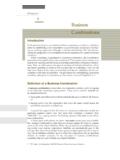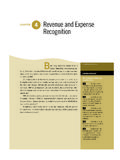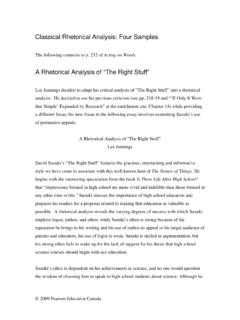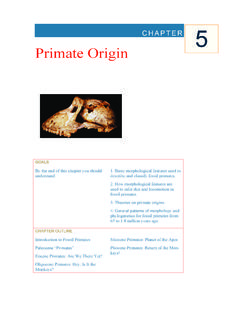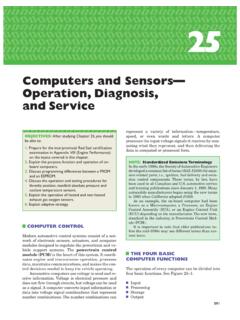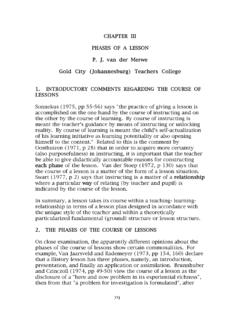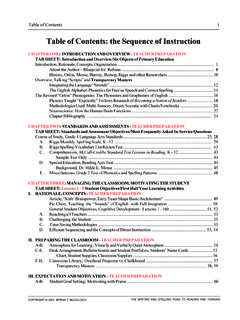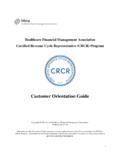Transcription of 02 beeb ch02 - Pearson
1 10/8/09 9:29 PM Page 32. C H A P T E R. 2 Interpersonal Communication and self OBJECTIVES. 1. Define, compare, and contrast the meanings of self -concept and self -esteem.. 2. Identify factors that shape the development of your self -concept. 3. List and describe strategies for improving your self -esteem. 4. Describe how your self -concept affects your relationships with others. 5. Describe the process of appropriate self -disclosure, including two models of self -disclosure. OUTLINE. self -Concept: Who Are You? self -Esteem: Your self -Worth Improving Your self -Esteem How self -Concept and self -Esteem Affect Interpersonal Communication and Relationships self -Disclosure: Connecting self to Others Through Talk Characteristics of self -Disclosure 10/8/09 9:29 PM Page 33. People tell themselves stories and then pour their lives into the stories they tell.
2 Anonymous P hilosophers suggest that there are three basic questions to which we all seek answers: (1) Who am I? (2) Why am I here? and (3) Who are all these others? In this chapter, we will focus on these essential questions. We view them as progressive. Grap- pling with the question of who you are and seeking to define a purpose for your life are fundamental to understanding others and becoming other-oriented in your interper- sonal communication and your relationships. Fundamentally, all of your communication starts or ends with you. When you are the communicator, you intentionally or unintentionally code your thoughts and emo- tions to be interpreted by another. When you receive a message, you interpret the in- formation through your own frame of reference. Your self -image and self -worth, as well as your needs, values, beliefs, and attitudes, serve as filters for your communica- tion with others.
3 As you develop and establish relationships, you may become more aware of these filters, and, perhaps, you will have the desire to alter them. A close rela- tionship often provides the impetus for change. To better understand the role that self -concept plays in interpersonal communica- tion, we will explore the first two basic questions, Who am I? and Why am I here? by trying to discover the meaning of self . We will examine the multi-faceted dimensions of our self -concept, learn how it develops, and compare self -concept with self -esteem. Then we will move to the third basic question, Who are all these others? What you choose to tell and not tell others about yourself reveals important clues about who you 2000 Thaves. Reprinted with permission. Newspaper dist. by NEA, Inc. 33. 10/8/09 9:29 PM Page 34. 34 Part 1 Foundations of Interpersonal Communication are, what you value, and how you relate to another person.
4 We will explore the process of self -disclosure purposefully revealing information about yourself later in this chapter. self -Concept: Who Are You? Y ou can begin your journey of self -discovery by trying the exercise in the Build- ing Your Skills box Who Are You? . Explore on mydevelopmentlab Watch on mycommunicationlab How did you answer the question, Who are you? Perhaps your self -descriptions identify activities in which you participate. Or they may list groups and organizations to which you belong or some of the roles you assume, such as student, child, or parent. All of these things are, indeed, parts of your self , the sum total of who you are. Karen Horney defines self as that central inner force, common to all human beings and yet unique in each, which is the deep source of growth. 1. Your answers are also part of your self -concept.
5 Your self -concept is your subjec- tive description of who you think you are it is filtered through your own perceptions. For example, you may have great musical talent, but you may not believe in it enough self . The sum total of who a to think of yourself as a musician. We can view self -concept as the labels we consis- person is; a person's central inner tently use to describe ourselves to others. force. Who you are is also reflected in the attitudes, beliefs, and values that you hold. self -concept. A person's These are learned constructs that shape your behaviour and self -image. An attitude is subjective description of who a learned predisposition to respond to a person, object, or idea in a favourable or un- the person thinks he or she is. favourable way. Attitudes reflect what you like and what you don't like. If you like attitude.
6 Learned predisposition school, butter pecan ice cream, and your mother, you hold positive attitudes toward to respond to a person, object, these things. You were not born with a fondness for butter pecan ice cream; you or idea in a favourable or learned to like it, just as some people learn to enjoy the taste of snails, raw fish, or unfavourable way. pur ed turnips. Building Your Skills Who Are You? I am _____ I am _____. C onsider this question: Who are you? More specifically, ask yourself this question 10 times. Write your re- I am _____ I am _____. sponses in the spaces provided here or on a separate piece of paper. It may be I am _____ I am _____. challenging to identify 10 aspects of yourself; the Spanish writer Cervantes said, to know thyself .. is the most dif- I am _____ I am _____. ficult lesson in the world. Your answers will help you begin to explore your self - concept and self -esteem in this chapter.
7 I am _____ I am _____. 10/8/09 9:29 PM Page 35. Chapter 2 Interpersonal Communication and self 35. Beliefs are the ways in which you structure your understanding of reality what is true and what is false. Most of your beliefs are based on previous experience. You trust that the sun will rise in the morning and that you will get burned if you put your hand on a hot stove. How are attitudes and beliefs related? They often function quite independently of one another. You may have a favourable attitude Values toward something and still believe negative things about it. You may believe, for example, that your college hockey team will not win the provincial championship this year, though you may be a big fan. Or Beliefs you may believe that a God exists, yet not always like what that God does. Beliefs have to do with what is true or not true; attitudes reflect likes and dislikes.
8 Attitudes Values are enduring concepts of good and bad, right and wrong. Your values are more resistant to change than either your attitudes or your beliefs. They are also more difficult for most people to identify. Val- FIGURE ues are so central to who you are that it is difficult to isolate them. For example, when you go to the supermarket, you may spend a few minutes deciding which cookies to Values, Beliefs, and Attitudes in buy, but you probably do not spend much time deciding whether you will steal the Relation to self cookies or pay for them. Our values are instilled in us by our earliest interpersonal re- lationships; for almost all of us, our parents shape our values. The model in Figure shows that values are central to our behaviour and concept of self , and that what we believe to be true or false stems from our values.
9 Attitudes are at the outer edge of the circle because they are the most likely to change. You may like your co-worker today but not tomorrow, even though you believe the person will come to work every day and you still value the concept of friendship. Beliefs are between attitudes and values in the model because they are more likely to change than our core values but don't change as much as our attitudes (likes and dislikes). Recap Who You Are Is Reflected in Your Attitudes, Beliefs, and Values Definition Dimensions Example Attitudes Learned predispositions to respond favourably Likes Dislikes You like ice cream, incense, and cats. or unfavourably toward something. Beliefs The ways in which we structure reality. True False You believe your parents love you. Values Enduring concepts of what is right and wrong. Good Bad You value honesty and truth.
10 Are You Conscious of Who You Are? Do you know what you're doing right now? Of course, you may think, I'm reading this textbook. But are you really aware of all of the fleeting thoughts bouncing in your head, whether you're truly happy or sad, or even whether you may be twiddling beliefs. The ways in which you a pencil, jiggling your leg, or in need of a snack? To be aware of who you are and what structure your understanding of you may be thinking about is a more involved process than you may think. reality what is true and what is false. Researchers have described three ways of being self -aware conscious of who you are and what you are doing: subjective self - awareness , objective self - awareness , and values. Enduring concepts of good and bad, right and wrong. symbolic Watch on mycommunicationlab 10/8/09 9:29 PM Page 36. 36 Part 1 Foundations of Interpersonal Communication subjective self - awareness .
